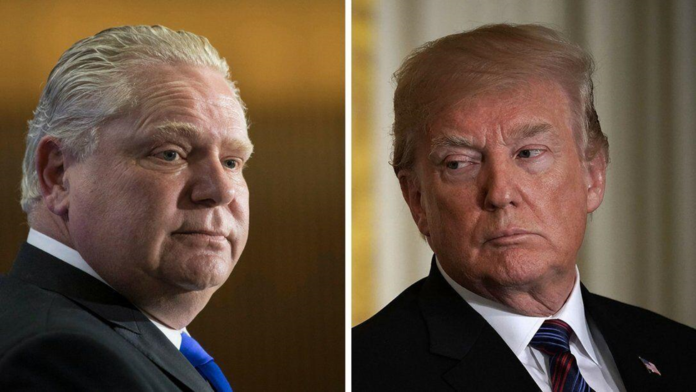If U.S. President-elect Donald Trump follows through on his threat to impose a 25 per cent tariff on all Canadian imports, Ontario is likely to bear the brunt of the impact, warned business experts.
“It’s going to have an incredibly focused impact, a disproportionate and focused impact, on southern Ontario,” according to Ian Lee, associate professor at Carleton University’s Sprott School of Business. “Ontario is going to take a huge, huge hit,” he warned.
Tariffs Tied to Border Security Demands
Trump has vowed to impose these tariffs as leverage to compel Canada and Mexico to help curb the flow of illegal migrants and drugs into the United States. The tariffs could be enacted as soon as Trump takes office in January.
Lee predicts that such a move would trigger immediate and severe economic consequences for Canada, starting with the national currency.
“The dollar is going to crash like a stone,” he said. “It will be a catastrophic decline.”
Given that Canada imports a third of its GDP, Lee noted, every Canadian would feel the ripple effects of a weakened dollar.
“Every last living, breathing Canadian is going to get hit because every time they buy something, it’s going to hit them,” he said.
Ontario’s Auto Sector at Risk
Ontario’s auto manufacturing sector, a key pillar of the province’s economy, could face devastating layoffs if the tariffs are implemented. Lee explained that a 25 per cent tariff would make Ontario-produced auto parts unaffordable for U.S. companies, forcing them to seek suppliers elsewhere.
“Twenty-five per cent will make those products from Canada uneconomic, uncompetitive… They will stop buying from Canada,” he said.
“So what will happen is that those (Ontario) companies will immediately put in emergency plans to lay off people.”
Such layoffs, he cautioned, would have a domino effect on the Canadian economy, potentially pushing the country into a recession.
Businesses Urge Preparedness
Catherine Fortin LeFaivre, vice-president of strategic policy and global partnerships at the Canadian Chamber of Commerce, echoed Lee’s concerns. She said the chamber is taking Trump’s tariff threats “very seriously.”
“I think we’re all trying to assess what exactly this will look like and it is hard to tell if this is a tactic or if we are actually looking at 25 per cent tariffs,” she said.
A recent report from the chamber’s business data lab found that even a 10 per cent tariff would lead to a productivity decrease of at least one per cent in Canada.
“We’re talking two, two-and-a-half times that,” Fortin LeFaivre said. “So you know we’re headed, if this were to be the case, in a recession state.”
The effects, she added, would not be limited to Ontario. U.S. consumers and businesses that rely on Ontario-made goods would also feel the impact.
“In terms of Ontario, we know that Ontario is a top export destination for 17 states,” she noted.
Political Leaders Urged to Act Strategically
Lee stressed the importance of a measured and strategic response from Canadian leaders. He warned against a “hot-headed” approach, advocating instead for dialogue to understand Trump’s specific demands.
“Open up dialogues and find out what does Trump want from us?” he said. “I’ve been following him for a long time, and he has many times talked about our protected industries… I’m talking about dairy. I’m talking about telecom.”
Doug Ford’s Role in Negotiations
Lee believes Ontario Premier Doug Ford should play a key role in negotiations with the Trump administration, given the province’s economic importance.
“He is the premier of the largest and most powerful and most important province in Canada,” Lee said. “I think that Premier Ford is going to be respected by the people around Trump and Trump because they’re more simpatico ideologically… They’re pro-business.”
Speaking to reporters last week, Ford underscored the magnitude of the threat, noting that Ontario conducts approximately $500 billion in trade with the U.S. annually.
“It’s like a family member stabbing you right in the heart,” Ford said.
The premier joined Prime Minister Justin Trudeau and other provincial leaders at an emergency first ministers’ meeting on Wednesday to address the issue. Lee emphasized that a united front between Ford and Trudeau will be crucial.
“They’ve got to put aside any differences they may have… they have to set those aside for the greater good of Canada,” Lee said.



